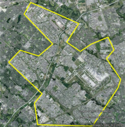It's been two decades since California Gov. Pete Wilson used grainy ads of undocumented immigrants – "They keep coming" – as an effective means of stoking fear of newcomers and assuring his re-election. Yet, increasingly America's immigration realities are moving far beyond the mojado paradigm of the 1990s in ways that challenges the stereotypes of both conservatives and progressives. read more »
The Evolving Urban Form: Toronto
Toronto is the largest city (metropolitan area) in Canada and its principal commercial center. However, this is a relatively recent development. Toronto displaced Montréal is Canada's largest city during the 1960s. Since the 1971 census, when the two Metropolitan areas were nearly identical size, Toronto has added approximately 3 million people, while Montréal has added approximately 1,000,000 (Figure 1). read more »
America’s Off-The-Radar Tech Hubs
At the moment, the technology sector is the focus of a lot of attention — and with good reason. Tech industries have helped turn San Jose and Austin into major economies and brought other large metros, like Detroit, through tough spells. But which small, off-the-radar towns out there also deserve recognition as technology hubs? read more »
America's New Manufacturing Boomtowns
Conventional wisdom for a generation has been that manufacturing in America is dying. Yet over the past five years, the country has experienced something of an industrial renaissance. We may be far from replacing the 3 million industrial jobs lost in the recession, but the economy has added over 330,000 industrial jobs since 2010, with output growing at the fastest pace since the 1990s. read more »
America’s New Oligarchs—Fwd.us and Silicon Valley’s Shady 1 Percenters
When Steve Jobs died in October 2011, crowds of mourners gathered outside of Apple stores, leaving impromptu memorials to the fallen businessman. Many in Occupy Wall Street, then in full bloom, stopped to mourn the .001 percenter worth $7 billion, who didn’t believe in charity and whose company had more cash in hand than the U.S. Treasury while doing everything in its power to avoid paying taxes.
A new, and potentially dominant, ruling class is rising. Today’s tech moguls don’t employ many Americans, they don’t pay very much in taxes or tend to share much of their wealth, and they live in a separate world that few of us could ever hope to enter. read more »
Why Gentrification?
The mostly commonly chosen means, or at least attempted means, of revitalizing central cities that have fallen on hard times is gentrification. Gentrification is the process of replacing the poor population of a neighborhood with the affluent and reorienting the district along upscale lines. This has seen enormous success in large swaths of New York and Chicago, but even traditionally struggling cities like Cleveland have seen pockets of this type of development downtown.
What makes gentrification so attractive as a redevelopment strategy? There are many reasons. read more »
Housing Market Fringe Movement
A year or two ago, pundits and planners, in California and elsewhere, proclaimed – and largely celebrated – the demise of suburbia. They were particularly heartened by a report, financed by portions of the real estate industry, that predicted the market for single-family homes in the state was hopelessly flooded, with a supply overhang of up to 25 years. read more »
Slow the Presses!
It has been a difficult time for newspapers. The industry has experienced serious challenges due to multiple factors going back at least to the early 1960s when the three major television networks began their extensive and widely popular evening news programs, with the likes of Walter Cronkite, Chet Huntley and David Brinkley.
Recent Setbacks read more »
The Average Manufacturing Establishment Is Smaller Than You Think, and Getting Smaller
The common image of American manufacturing, as Harold L. Sirkin wrote in Bloomberg Businessweek, is of huge plants with waves of assembly-line workers producing cars and refrigerators. But there’s a whole other world of niche manufacturers in the U.S., and these small firms are more typical — and should be more of a priority, Sirkin argued — than you might think. read more »
The Cleveland Miracle That Should Never Have Been
“[T]he most obvious, ubiquitous, important realities are often the ones that are the hardest to see and talk about.” Writer David Foster Wallace
The story of the three Cleveland women kidnapped over 10 years ago and recently found alive in a house on the city’s Near West Side has captivated the national imagination. There is the miracle aspect from the fact that such situations rarely end this way. read more »






















